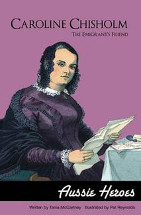Caroline Chisholm: The emigrant's friend by Tania McCartney

New Frontier Publishing, 2013. ISBN 9781921928482.
(Age 7+) Caroline Chisholm was a wife, mother, traveller, social
worker, activist, researcher, public speaker and advocate for
education. Her achievements were doubly remarkable in an era when
women often found it difficult to make a contribution outside the
home.
In the opening chapters, readers will learn about the childhood
experiences that shaped not only Caroline's motivation to help
others, but also her eagerness to travel beyond the confines of a
comfortable home in England. Then, as they follow the course of her
adult life, they can wonder at her ability to devise practical
solutions to a range of problems confronting emigrants. During 32
years of activism, Caroline organised accommodation and education
for young women, lobbied on behalf of settlers for land leases,
helped to reunite convicts with their families, set up a loan
society and arranged a system of shelter sheds for families
journeying to the goldfields. The author has created a well-rounded
character who experienced setbacks as well as successes, and whose
accomplishments owed much to the collaboration and support of her
husband Archibald. The inclusion of an Indigenous perspective on the
promotion of emigration and land sales, might have added more depth
to the story of the woman who was said by Henry Parkes to have
'peopled' Australia. Tania McCartney has told her story swiftly and
decisively in short, vivid sentences that bring an extraordinary
pioneer and her era to life. Pat Reynold's watercolour illustrations
provide small but effective snapshots of people and locations. In
keeping with the format of the Aussie Heroes series, the large,
clear font, chapter headings and timeline make this biography a
useful resource for the study of Australian history as well as a
fascinating story in its own right.
Caroline Chisholm: The emigrant's friend takes its readers on
the life journey of an extraordinary woman, whose aim was to improve
the well-being of others and whose impact on colonial society
deserves to be recognised as central to our country's history.
Elizabeth Bor